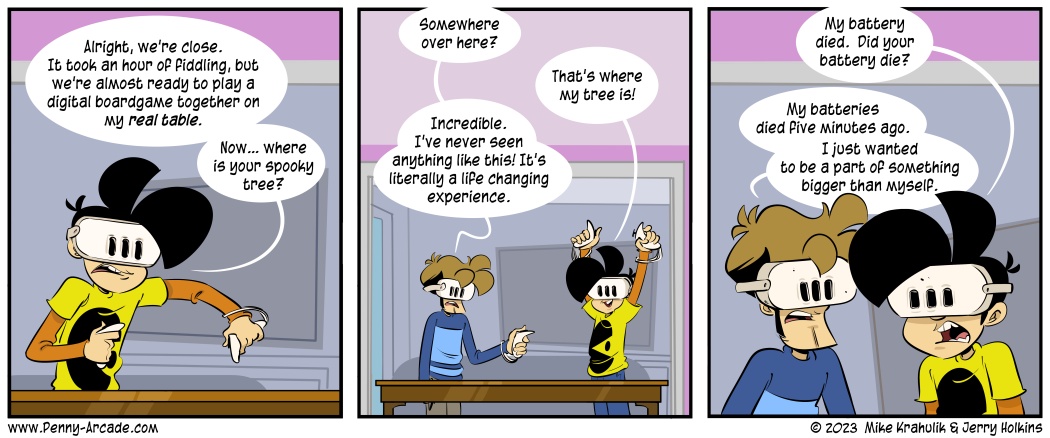Penny Arcade - Comic - The Aspirationalist
Dog Registered User, Administrator, Vanilla Staff admin
Registered User, Administrator, Vanilla Staff admin
 Registered User, Administrator, Vanilla Staff admin
Registered User, Administrator, Vanilla Staff admin

Penny Arcade - Comic - The Aspirationalist
Videogaming-related online strip by Mike Krahulik and Jerry Holkins. Includes news and commentary.
+6
Posts
PSN:Furlion
Also, I cannot remember a gaming session ever that didn't require looking up a rule (which is a nightmare in VR) or that didn't last longer than the battery life of the headset. While I think there may be a future in which AR tabletop systems are a thing, I think the Quest is getting too far ahead of itself with this one.
This is quite a tricky endeavor at this phase of the technology's maturity.
On the other hand, you can play games in AR/VR pretty easily without all that jazz. And to me, that's where it really shines. If I'm in the same room, I'd rather just play an actual tabletop game and get to enjoy all the tactility of it. But if I'm not, it'd be great to have a good solution to naturally play tabletop games with hand tracking.
Unfortunately, no one has been able to come up with that thing. TTS in VR is pretty terrible (but then, I find it a pretty terrible UX out of VR as well). There's at least one fledgling project to try to bring generic tabletop into VR. I very much hope they pull it off, but as a vr developer I am skeptical. There's just a whole lot of frustrating problems to solve, and not just because it's in VR. Game engine physics can be pretty persnickety, and tabletop games involve a lot of objects physically interacting.
In theory, these type of generic systems would allow players to be both in VR and on flatscreen devices. However, it's not all that fun to manipulate a fully simulated world through kbm/controller. You'd often rather just click on a button to pay your coin, rather than to have to mouse over a physical coin, pick it up, drag it to the bank, release to drop, then repeat for all the other coins you need to pay your bill. So now you're having to design both a physical play space and a more abstracted UI as well to make all that work best, when either of those is already a heavy lift.
While I haven't tried Demeo's co-presence (as shown in the strip), I have tried their hand tracking (use your hands instead of controllers). It's... not great. It's not terrible, but there's a lot of shortcomings. I may notice it even more because I work at a company that has years of work into making a robust hand tracking system with lots of code wrapped around various object interactions. But even with all that, we often have situations where we don't like how it feels. I do wish I could wrangle a Demeo devs ear sometimes and just give them two or three suggestions that would greatly improve their UX. But I imagine they are a much smaller team with a lot less resources to spend on a niche of a niche of a niche (hand tracking in a tabletop game for a VR headset).